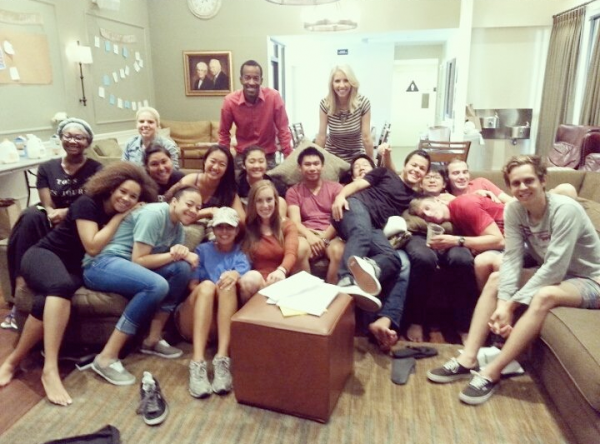
Leaving home, knowing no one, finding your classes, ordering your books. How can the first year of college be more stressful?
Roommate issues.
An online Graphic survey in spring 2015 found that 34 out of 50 Pepperdine students reported having some sort of freshmen roommate issue.
Interviews with Pepperdine’s resident advisors, future RAs and freshmen showed five recurring problems freshmen may face with their roommates: disregarding quiet hours, lack of consideration for the other, taking or using things without asking, failing to set mutual expectations and loneliness.
A follow-up survey of 63 students last spring showed the most common problem students faced with roommates was feeling their roommates showed a lack of consideration for the other and feeling lonely or left out even with a roommate.
“Freshmen roommate problems…oh boy,” Jordan Jacobs, a junior business major, said when she discovered the topic of this article.
Pepperdine puts its RAs through multiple interviews, trainings and meetings before they receive the responsibility of advising incoming students.
“RAs go through extensive emergency and conflict training, but training can only prepare you so much,” Jenna Pautsch, a senior business major and RA, said. “We are faced with many mock situations before school starts, which can be good practice, but this job takes a lot of discernment depending on the situation, and the real training comes with experience.”
Pepperdine has a set time from 10 a.m. to 10 p.m. called “quiet hours.” Students are not allowed to talk or play music loudly, out of respect for their roommates and suitemates. The first offense gets a warning and any other subsequent offenses result in fines.
“I have noticed a lack of respect for quiet hours,” Pautsch said.
Other RAs said freshmen often complain about their roommates turning on the light when they are sleeping, inviting people over without asking and leaving the room a mess.
“My suitemate always complains about how inconsiderate her roommate is,” Ilyn Brown, a sophomore public relations major, said of her freshman year suitemate. “(The suitemate) said she watches movies without headphones when she’s sleeping…so rude.”
Sharing is caring but at some point, a line is drawn.
“My roommate always eats my food, uses my shampoo and borrows my clothes without asking,” Joshua Barrientes, a sophomore business administration major, said of his freshman year roommate. “At first I didn’t care, but now it drives me insane.”
Trying to find the balance between being friends and roommates can be hard but it is very necessary to discuss mutual expectations with your roommate, said Dacoda Clarke, a sophomore integrated marketing major and RA.
Being friends with your roommate might sound like the best of both worlds, but interviews showed otherwise.
Brown shared her story of how her and her freshman year roommate did not discuss the boundaries between being friends and roommates, resulting in the lines becoming blurred.
“We started off really close, then the little things started tearing us apart,” Brown said. “Now, we don’t even speak and it’s been really difficult.”
Annette Lee, a junior public relations major, said she has many friends who had freshman roommate problems.
“I think freshmen try to be friends before roommates and that’s where they go wrong,” Lee said. “You have to build a mutual respect as roommates, then you can possibly establish a friendship.”
Even with a roommate, students can still feel lonely.
Matthew Myatt, a senior political science and sociology major, said that loneliness is one of the issues he has run into as an RA.
These common roommate issues affect students emotionally and physically.
Samantha Gonzales, a sophomore integrated marketing communications major, experienced freshman roommate problems that made her decide to move out.
“I lost some of my closest friends and it was really hard for me,” Gonzales said. “But time heals all wounds.”
Healthline.com reported in a study that one out of four college students suffer from depression and that “failed relationships and conflicts with roommates are enough to force some students to leave college or worse.”
With the rising number of college students feeling depressed or suicidal, “emotional health is something that should be very important to all RAs,” Jacobs said.
Colleen Cronin, a first-year law student, said she has had her fair share of roommate problems.
“I think roommate issues usually come from a small misunderstanding but can escalate to make both parties feel uncomfortable at home and hinder students from being able to relax and wind down,” Cronin said.
RAs are the first line of defense in dealing with roommate issues.
All RAs are required to have a GPA of 2.5 or higher, supply references and arrive two weeks before the fall semester for training.
Megan Duncan, a senior advertising and multimedia design major, used to be an RA’s roommate and she also assisted in helping freshmen settle disagreements. She witnessed and heard second-hand of the issues her roommate, Pautsch, had to reconcile.
“I think the current training they receive is very thorough,” Duncan said.
When problems get out of hand or too much for the RAs to deal with, they contact their resident director, the Department of Public Safety, or Housing and Residence Life.
The resident directors are often older or Pepperdine graduates so they have more experience and knowledge on conflict resolution. DPS is for emergency or dire situations while HRL is generally for when students need a room switch or new roommate.
Pepperdine offers many ways in which students can reconcile their roommate issues whether that means a simple conversation or getting a new roommate, Myatt said. Students can turn to their RAs or the residential director.
“If there is an issue, it can more than likely be worked out,” Myatt said.
HRL, the counseling center, and professors are also ways in which students can address their roommate problems.
Georgia Lydon, a sophomore sports medicine major and an RA, said she believes that Pepperdine offers many ways for freshmen to talk about their problems.
“I’d suggest that students take advantage of Pepperdine’s Counseling Center for emotional issues,” Lydon said.
RAs said they are excited about their positions this year, especially Syrii Daniel, a senior sports medicine major, who is looking forward to being a big sister to all the freshmen girls.
Lydon is excited for more spiritual reasons.
“I think the most fulfilling part will be living out God’s plan for me and serving him in this capacity,” Lydon said. “I also think that being witness to the growth and maturity of freshmen girls will be very fulfilling.”
Amber Villasenor completed this story in Dr. Christina Littlefield’s spring 2015 Jour 241 class.



